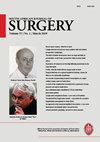An audit of traumatic haemothoraces in a regional hospital in KwaZulu-Natal, South Africa
IF 0.4
4区 医学
Q4 SURGERY
引用次数: 0
Abstract
Haemothorax occurs in approximately 60% of all thoracic and polytrauma cases and is responsible for 15-30% of all trauma mortalities. Penetrating injuries to the thorax are a common presentation in South African hospitals. This study aims to audit the traumatic haemothoraces and their outcomes in regional hospitals in Durban, KwaZulu-Natal, South Africa.In this study, patient characteristics were grouped as either continuous or categorical variables. Continuous variables, such as age were summarised as means (with standard deviations) or medians (interquartile range [IQR]), as appropriate. Categorical variables such as sex were summarised as proportions. Fisher's exact test was used to compare proportions. All analyses were performed using the Statistical Package for Social Sciences.A total of 118 patients were included comprising 110 (93%) males and eight (7%) females, with an average age of 29.7 years. Stab-chest was the most frequent mechanism of injury (76; 64.4%), followed by gunshot wound (GSW)- chest (27; 22.9%) and isolated blunt chest trauma (9; 7.6%). Other mechanisms of injury were stab-neck (3; 2.5%), stab-shoulder (2; 1.7%) and blunt chest trauma in the context of polytrauma (1; 0.8%). The most frequent type of injury was penetrating (108; 91.5%), with only 10 (8.5%) cases of blunt injury. This study found that there was a statistically significant association between patient age groups and type of injury.Haemothorax is a common sequela of chest trauma. Retained haemothorax (RH) results in worsened patient outcomes including increased hospital length of stay (LOS). This study points to the need for auditing of proper intercostal chest drain (ICD) positioning, which is crucial for the successful drainage of haemothorax.南非夸祖鲁-纳塔尔省一家地区医院外伤性血胸的审计
在所有胸部和多发创伤病例中,约60%的病例发生血性胸,在所有创伤死亡率中占15-30%。胸部穿透性损伤是南非医院常见的症状。本研究的目的是审计创伤性胸出血和他们的结果在德班地区医院夸祖鲁-纳塔尔省,南非。在这项研究中,患者的特征分为连续变量和分类变量。连续变量,如年龄,酌情汇总为平均值(带标准差)或中位数(四分位数间距[IQR])。诸如性别之类的分类变量被总结为比例。费雪精确检验被用来比较比例。所有分析均使用社会科学统计软件包进行。纳入118例患者,其中男性110例(93%),女性8例(7%),平均年龄29.7岁。刺胸是最常见的损伤机制(76;64.4%),其次是枪伤(GSW)-胸部(27;22.9%)和孤立性钝性胸外伤(9;7.6%)。其他损伤机制包括刺颈(3;2.5%),刺肩(2;1.7%)和钝性胸外伤在多发伤的背景下(1;0.8%)。最常见的伤害类型是穿透性(108;91.5%),而钝性损伤只有10例(8.5%)。本研究发现,患者年龄组和损伤类型之间存在统计学上显著的关联。血胸是胸部外伤的常见后遗症。残留的血胸(RH)导致患者预后恶化,包括住院时间(LOS)的增加。本研究指出需要对正确的肋间胸引流(ICD)定位进行审计,这对于成功引流血胸至关重要。
本文章由计算机程序翻译,如有差异,请以英文原文为准。
求助全文
约1分钟内获得全文
求助全文
来源期刊
CiteScore
0.80
自引率
20.00%
发文量
43
审稿时长
>12 weeks
期刊介绍:
The South African Journal of Surgery (SAJS) is a quarterly, general surgical journal. It carries research articles and letters, editorials, clinical practice and other surgical articles and personal opinion, South African health-related news, obituaries and general correspondence.

 求助内容:
求助内容: 应助结果提醒方式:
应助结果提醒方式:


